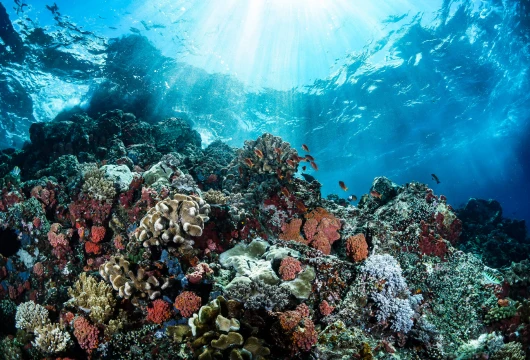Maldives Resorts Lead the Way in Coral Restoration
The Maldives, renowned for its pristine beaches and turquoise waters, is taking a bold step in marine conservation. With coral reefs worldwide under severe threat due to climate change, Maldivian luxury resorts are pioneering innovative coral restoration programs. These initiatives safeguard marine biodiversity and offer travelers a unique opportunity to engage in sustainable tourism.
The Urgent Need for Coral Restoration
Coral reefs are often called the “rainforests of the sea” due to their immense ecological value. According to the United Nations Environment Programme (UNEP), these vibrant ecosystems support diverse marine species, protect coastlines from erosion, and play a vital role in carbon sequestration.
However, global warming, pollution, and unsustainable human activities have led to widespread coral bleaching. When ocean temperatures rise, corals expel the algae that provide them with nutrients and color, resulting in lifeless, white reefs. While some corals can recover, prolonged bleaching often leads to their demise.
The Maldives, home to some of the world’s most extensive coral reef systems, experienced significant bleaching events in 1998 and 2016. As these fragile ecosystems face threats, Maldivian resorts have stepped up with impactful coral restoration efforts.
Luxury Resorts Embracing Coral Restoration
Understanding the need for immediate action, several high-end resorts in the Maldives have integrated coral restoration projects into their sustainability frameworks. These programs involve transplanting coral fragments, creating artificial reefs, and engaging tourists in conservation activities.
Ozen Life Maadhoo: A Hands-On Approach to Coral Conservation
Ozen Life Maadhoo, a luxury resort in South Malé Atoll, has made coral restoration a central part of its environmental mission. The resort recently organized a coral tree plantation initiative led by resident marine biologist Oshin Joanna Christopher. Guests were invited to participate in this hands-on experience, fostering awareness and involvement in marine conservation.
The project focuses on “corals of opportunity”—loose coral fragments that have broken off due to natural causes. Instead of being left to perish, these fragments are collected and attached to metal tree structures made from recycled materials. Once the trees are submerged in designated coral nurseries, the corals can regrow and contribute to the reef’s revival.
According to Oshin, the nursery houses “super corals”—species that have naturally withstood past bleaching events. The resort aims to strengthen the reef’s ability to endure future climate challenges by propagating these resilient corals.
Henar Gil Rios, General Manager of Ozen Life Maadhoo, emphasized the resort’s long-term commitment:
“Our coral restoration efforts go beyond tourism. We integrate sustainability into every aspect of our operations, from responsible procurement to solar energy initiatives. Being Green Globe certified reaffirms our dedication to preserving the marine ecosystem.”
Innovative Approaches to Coral Regeneration
Other Maldivian resorts have also embraced cutting-edge techniques for coral restoration.
Patina Maldives: Advancing Coral Growth with Ceramic Structures
Patina Maldives stands out as the only resort in the region using molded ceramic structures to stimulate coral growth. This innovative method accelerates the regeneration process and provides a stable habitat for marine life.
Guests at Patina Maldives can participate in coral propagation workshops guided by expert marine biologists. So far, the resort has successfully planted over 3,000 coral fragments using 60 coral frames and 70 ceramic structures. This holistic approach ensures that both guests and local communities contribute to preserving the marine ecosystem.
The Conrad Maldives: Building Artificial Coral Habitats
The Conrad Maldives Rangali Island has developed artificial reef structures designed to support coral regeneration. These reef systems mimic natural environments, encouraging the settlement and growth of coral polyps. Over time, these artificial reefs become thriving marine habitats, attracting fish and other aquatic species.
Why Coral Restoration Matters for Sustainable Tourism
The rising trend of conscious luxury—combining high-end travel with responsible environmental practices—is reshaping the hospitality industry. Tourists today seek experiences that contribute positively to the environment, and Maldivian resorts are leading the charge.
By integrating coral restoration programs into their offerings, these resorts are:
- Preserving Marine Biodiversity: Healthy coral reefs sustain countless marine species, ensuring a balanced ecosystem.
- Enhancing Coastal Protection: Reefs act as natural barriers, reducing the impact of waves and preventing shoreline erosion.
- Promoting Sustainable Tourism: Guests actively participate in conservation, making their travel experiences meaningful.
- Fostering Climate Resilience: Restoring corals helps strengthen their adaptability to changing ocean conditions.
As these efforts gain momentum, the Maldives is setting a global example of how luxury tourism can align with environmental stewardship.
Future Prospects: Scaling Up Coral Restoration
While the progress in coral restoration is commendable, continuous efforts are required to ensure long-term success. Scientists are exploring advanced techniques such as:
- Cryopreservation: Preserving coral larvae at extremely low temperatures for future restoration.
- Genetic Engineering: Enhancing coral resilience through selective breeding of heat-resistant species.
- Artificial Intelligence: Using AI-driven monitoring systems to track reef health and detect stress factors early.
Combining science, technology, and sustainable tourism, the Maldives is paving the way for large-scale coral restoration projects that could benefit marine ecosystems worldwide.
How Travelers Can Contribute
Visitors to the Maldives can play a crucial role in coral conservation by:
- Participating in coral planting initiatives at eco-conscious resorts
- Choosing accommodations that prioritize sustainability and reef protection
- Avoiding activities that damage corals, such as stepping on reefs or using harmful sunscreens
- Supporting organizations that work on marine conservation
Every small effort counts. Whether it’s attaching a coral fragment to a restoration frame or simply spreading awareness, travelers can be active participants in safeguarding the future of our oceans.
A Model for Sustainable Marine Conservation
The Maldives is proving that luxury and sustainability can go hand in hand. By integrating coral restoration into their tourism model, Maldivian resorts are enhancing guest experiences and playing a critical role in protecting marine biodiversity.
With ongoing innovation, community involvement, and global support, the Maldives’ coral restoration initiatives offer hope for reefs worldwide. As travelers, hoteliers, and conservationists unite, the dream of reviving coral ecosystems becomes a reality—one coral fragment at a time.
For more in-depth analysis and inspiring climate news, click here.

